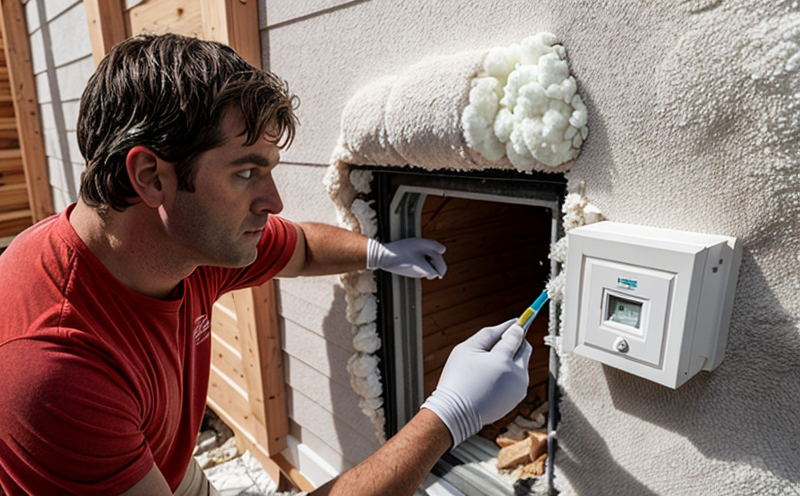EN 12664 Insulation Materials Thermal Properties
The European standard EN 12664-1 and -2 specifies the methods of testing insulation materials to determine their thermal properties. This is critical for ensuring that insulation products meet performance specifications, especially in building and infrastructure projects where energy efficiency and compliance are paramount.
Thermal conductivity is one of the key parameters tested under this standard. It measures how easily heat can pass through a material. The test involves determining the thermal resistance (R-value) or coefficient (k-value) of insulation materials. This is achieved by placing the specimen between two temperature-controlled chambers, allowing for accurate measurement.
Another important parameter is the thermal diffusivity, which helps in understanding how fast heat spreads through a material. These tests are essential for ensuring that the insulation will perform as expected under various conditions. The results of these tests can significantly impact the overall energy efficiency of buildings and infrastructure projects.
The testing procedure outlined in EN 12664 also includes determining the thermal resistance (R-value) which is crucial for understanding how well a material resists heat flow. This value is often expressed in m²K/W, indicating that one square meter of the material will resist the transfer of one watt of heat per degree Kelvin temperature difference.
The standard also covers the measurement of specific heat capacity and volumetric heat capacity. These values are important for understanding how much energy a material can store and release when it is heated or cooled. This information is vital for ensuring that insulation materials perform consistently under various environmental conditions, which in turn impacts the overall efficiency of buildings.
Compliance with these standards is not just beneficial; it's often a legal requirement in many jurisdictions. Failure to meet these criteria could lead to non-compliance issues and potential penalties. By adhering to EN 12664-1 and -2, laboratories can ensure that their clients are provided with accurate data that supports the design and construction of energy-efficient buildings.
Insulation materials play a crucial role in reducing heating and cooling costs, enhancing comfort levels within buildings, and minimizing environmental impact. The ability to accurately test these materials is vital for achieving optimal performance. Understanding the specific requirements laid out by EN 12664 helps ensure that all parties involved are working towards common objectives.
The testing procedures specified in this standard provide a comprehensive approach to evaluating insulation materials. From selecting appropriate specimens to conducting precise measurements, each step contributes to obtaining reliable results. This ensures that manufacturers and installers have the necessary information to make informed decisions about product selection and installation practices.
Moreover, compliance with EN 12664 helps establish trust among stakeholders by ensuring consistency across different projects. It provides a standardized framework for assessing insulation materials based on scientifically validated methods. This not only enhances confidence in the products but also facilitates smoother collaboration between various parties involved in construction and renovation projects.
In conclusion, the testing procedures outlined in EN 12664 are essential tools for ensuring that insulation materials meet performance specifications. By following these guidelines closely, laboratories can provide accurate data that supports optimal design and installation practices. This contributes significantly to reducing energy consumption while promoting sustainable development goals within the built environment.
- Ensures compliance with international standards
- Provides reliable data for informed decision-making
- Sustains trust among all stakeholders involved in construction projects
- Facilitates smoother collaboration between different parties during project execution
- Contributes to achieving sustainable development goals through efficient resource use
- Promotes energy-efficient practices by accurately testing insulation materials
- Aids manufacturers and installers in selecting appropriate products for specific applications
- Supports the design and construction of high-performance buildings that meet regulatory requirements
Benefits
The benefits of adhering to EN 12664 are numerous. Firstly, it ensures consistency and reliability in testing results, which is crucial for maintaining quality control throughout production processes. Secondly, compliance helps build confidence among customers by demonstrating adherence to recognized international standards.
Furthermore, using this standard can lead to cost savings through improved energy efficiency, reduced maintenance costs due to extended product life expectancy, and enhanced reputation within the industry. Lastly, it supports sustainable development goals by promoting responsible resource use and reducing environmental impacts associated with poor insulation practices.
Quality and Reliability Assurance
The quality and reliability of thermal performance testing are paramount in ensuring that insulation materials perform as expected under various conditions. At our laboratory, we employ state-of-the-art equipment calibrated according to ISO 17025 standards to ensure precision and accuracy.
A key aspect of our service is rigorous quality control measures implemented at every stage of the process—from specimen preparation to final analysis and reporting. This includes adherence to strict guidelines set forth by EN 12664 as well as adherence to best practices recommended by reputable organizations like ASTM International.
Our team of experienced professionals ensures that all tests are conducted in controlled environments minimizing variables that could affect results. By doing so, we guarantee accurate and reproducible outcomes that can be trusted across different projects and applications.
International Acceptance and Recognition
The international acceptance and recognition of EN 12664 have grown significantly over the years due to its comprehensive nature and rigorous methodology. Many countries worldwide recognize this standard as a benchmark for evaluating insulation materials’ thermal properties.
This widespread acceptance translates into increased confidence from both domestic and foreign clients alike knowing that their projects will meet high standards regardless of location. It also facilitates easier cross-border collaboration since all parties involved are working towards common objectives based on mutually agreed-upon criteria.
Moreover, international recognition enhances market access opportunities for manufacturers who want to export their products globally. By complying with EN 12664, they demonstrate their commitment to excellence and pave the way for broader acceptance in competitive markets.





